#Docker and Kubernetes Training in Hyderabad
Explore tagged Tumblr posts
Text
Docker Online Training Hyderabad | Visualpath
Why Developers Should Learn Docker and Kubernetes?
Introduction:
As technology continues to evolve, developers are constantly seeking tools and platforms that can streamline their workflows, increase productivity, and ensure seamless deployment of applications. Two such tools that have become indispensable in the developer toolkit are Docker and Kubernetes.
Docker:
Docker has revolutionized the way applications are packaged, shipped, and deployed. At its core, Docker provides a platform for developers to build, package, and distribute applications as lightweight containers. These containers encapsulate all the dependencies and libraries required for the application to run, ensuring consistency across different environments. - Kubernetes Online Training
One of the key advantages of Docker is its portability. Developers can package their applications along with all the necessary dependencies into a Docker container, allowing them to run seamlessly on any machine with Docker installed. This eliminates the notorious "it works on my machine" problem and simplifies the process of deploying applications across different environments, from development to production.
Furthermore, Docker facilitates a microservices architecture, where applications are broken down into smaller, modular components that can be independently developed, deployed, and scaled. This promotes agility, scalability, and fault isolation, making it easier for developers to iterate on their code and respond to changing business requirements. - Docker Online Training
Kubernetes:
While Docker simplifies the process of containerization, managing a large number of containers across a distributed environment can quickly become complex and challenging. This is where Kubernetes comes into play. Kubernetes, often abbreviated as K8s, is an open-source container orchestration platform that automates the deployment, scaling, and management of containerized applications.
At its core, Kubernetes provides a declarative approach to managing containerized workloads. Developers can define the desired state of their applications using Kubernetes manifests, specifying factors such as the number of replicas, resource requirements, and networking configurations. Kubernetes then ensures that the actual state of the system matches the desired state, automatically scaling applications up or down based on demand and reallocating resources as needed. - Docker and Kubernetes Training
Moreover, Kubernetes offers robust features for service discovery, load balancing, and self-healing, enhancing the resilience and reliability of applications in production environments. It also supports advanced deployment strategies such as rolling updates and canary deployments, allowing developers to release new features gradually while monitoring the impact on performance and stability.
Conclusion:
In conclusion, Docker and Kubernetes represent a powerful combination that empowers developers to build, deploy, and manage applications more efficiently and effectively. By leveraging Docker's containerization technology and Kubernetes' orchestration capabilities, developers can streamline their workflows, increase scalability, and ensure seamless deployment across diverse environments.
Visualpath is the Leading and Best Institute for learning Docker And Kubernetes Online in Ameerpet, Hyderabad. We provide Docker Online Training Course, you will get the best course at an affordable cost.
Attend Free Demo
Call on - +91-9989971070.
Visit : https://www.visualpath.in/DevOps-docker-kubernetes-training.html
WhatsApp : https://www.whatsapp.com/catalog/919989971070/
#docker and kubernetes training#docker online training#docker training in hyderabad#kubernetes training hyderabad#docker and kubernetes online training#docker online training hyderabad#kubernetes online training#kubernetes online training hyderabad
0 notes
Text
DevOps AWS Training| IntelliQIT | Best DevOps AWS Training in Hyderbad
Ameerpet in Hyderabad is a hub for IT training, offering many institutes for DevOps courses. DevOps helps automate and improve software development and IT operations. Here are some things to look for when choosing a best devops training institute in hyderabad:
Comprehensive Course Content
Covers essential DevOps tools like Jenkins, Docker, Git, and Kubernetes.
Includes both basic and advanced topics.
Hands-on Training
Focus on real-time projects to get practical experience.
Live demos and interactive sessions.
Flexible Learning Options
Offers both online and classroom classes to suit your schedule.
Some institutes provide free demo classes.
Placement Support
Helps with job placements through resume building and interview prep.
Offers guidance for certifications if needed.
Experienced Trainers
Trainers with real-world DevOps experience.
Good student-to-trainer ratio for personalized attention.
When choosing an institute, make sure it offers practical training, expert guidance, and good placement opportunities to kickstart your career in DevOps.
#devops training institutes in ameerpet#best devops training institute in hyderabad#devops training in ameerpet
2 notes
·
View notes
Text
Bridging the Gap: A Developer's Roadmap to Embracing DevOps Excellence
In the ever-evolving landscape of software development, the role of a DevOps engineer stands out as a crucial link between development and operations. For developers with an eye on this transformative career path, acquiring a unique skill set and embracing a holistic mindset becomes imperative. In the city of Hyderabad, DevOps Training offers a strategic avenue for individuals keen on validating their proficiency in DevOps practices and enhancing their career trajectory.

Charting the DevOps Odyssey: A Developer's Comprehensive Guide
Shifting gears from a developer to a DevOps engineer involves a nuanced approach, harmonizing development expertise with operational acumen. Here's a detailed step-by-step guide to assist developers aspiring to embark on the dynamic journey into the world of DevOps:
1. Grasp the Fundamentals of DevOps: Establish a solid foundation by delving into the core principles of DevOps, emphasizing collaboration, automation, and a culture of continuous improvement. Recognize the significance of the cultural shift required for successful DevOps implementation.
2. Master Git and Version Control: Dive into the world of version control with a mastery of Git, including branches and pull requests. Proficiency in these areas is pivotal for streamlined code collaboration, versioning, and effective tracking of changes.
3. Cultivate Scripting Skills (e.g., Python, Shell): Cultivate essential scripting skills to automate mundane tasks. Languages like Python and Shell scripting play a key role in the DevOps toolchain, providing a robust foundation for automation.
4. Explore Containers and Kubernetes: Immerse yourself in the realms of containerization with Docker and orchestration with Kubernetes. A comprehensive understanding of these technologies is fundamental for creating reproducible environments and managing scalable applications.
5. Grasp Infrastructure as Code (IaC): Familiarize yourself with Infrastructure as Code (IaC) principles. Tools like Terraform or Ansible empower the codification of infrastructure, streamlining deployment processes. The pursuit of the Best DevOps Online Training can offer profound insights into leveraging IaC effectively.

6. Experiment with Continuous Integration/Continuous Deployment (CI/CD): Take the leap into CI/CD territory with experimentation using tools like Jenkins or GitLab CI. The automation of code testing, integration, and deployment is pivotal for ensuring swift and reliable releases within the development pipeline.
7. Explore Monitoring and Logging: Gain proficiency in monitoring and troubleshooting by exploring tools like Prometheus or Grafana. A deep understanding of the health and performance of applications is crucial for maintaining a robust system.
8. Foster Collaboration with Other Teams: Cultivate effective communication and collaboration with operations, QA, and security teams. DevOps thrives on breaking down silos and fostering a collaborative environment to achieve shared goals.
Remember, the transition to a DevOps role is an evolutionary process, where gradual incorporation of DevOps practices into existing roles, coupled with hands-on projects, fortifies the foundation for a successful journey towards becoming a DevOps engineer.
3 notes
·
View notes
Text
Building Scalable Web Applications with ASP.NET Core
In the ever-evolving world of web development, building applications that can grow with user demand is critical. ASP.NET Core, Microsoft’s powerful open-source framework, is trusted by developers worldwide to create high-performance, scalable web solutions. To gain hands-on expertise in this robust framework, consider enrolling at the Best DotNet Training Institute in Hyderabad, Kukatpally, KPHB, where expert instructors and practical sessions help turn learners into professionals.
Why Choose ASP.NET Core for Scalable Apps?
ASP.NET Core stands out due to its modern architecture and performance-first approach. It’s lightweight, modular, and built from the ground up to support cloud-based and enterprise-level applications.
Cross-Platform Development: Write once, deploy anywhere—Windows, Linux, or macOS.
An efficient web framework: It's one of the fastest frameworks on the market.
Microservices Ready: Easily build and manage microservices with Docker and Kubernetes support.
Core Features Supporting Scalability
Asynchronous Programming
ASP.NET Core's support for asynchronous programming allows applications to handle multiple requests efficiently, minimizing latency even under high loads.
Built-in Dependency Injection
This helps manage complex application dependencies cleanly, allowing better control and scalability.
Middleware Pipeline
Customize the request-response pipeline to ensure efficient data handling, performance tuning, and modular control.
Integration with Modern Tools and Cloud Platforms
ASP.NET Core seamlessly integrates with:
Azure Cloud Services for flexible deployment and scalability.
Entity Framework Core for efficient data access.
SignalR for real-time web functionalities.
Front-end libraries like Angular and React for building full-stack applications.
These integrations empower developers to build feature-rich, cloud-native applications that scale as user demand grows.
Community Support and Continued Growth
ASP.NET Core benefits from a strong global developer community and regular updates from Microsoft. You’ll find thousands of tutorials, forums, and open-source projects that accelerate your learning and problem-solving.
Conclusion
Developing scalable web applications is no longer optional-it's a fundamental requirement. ASP.NET Core offers the flexibility, performance, and tools needed to build apps that grow with your business. To truly master it and launch a rewarding development career, consider training with Monopoly IT Solutions, where real-world projects, expert trainers, and career guidance await.
#best dotnet training in hyderabad#best dotnet training in kukatpally#best dotnet training in kphb#best .net full stack training
0 notes
Text
How Cloud Computing Is Shaping the Future of Data Science
Introduction: Cloud and Data Science—A Powerful Combination
In today’s data-driven world, cloud computing has become a game-changer for the tech industry, especially in the field of data science. With the growing demand for skilled professionals, many learners are seeking the best data science training in Hyderabad to stay competitive. Cloud platforms are now essential tools that data scientists rely on to access resources, process data, and deploy models more efficiently and affordably than ever before.
On-Demand Resources and Scalability
Cloud computing offers a flexible environment where data scientists can scale up or down based on their project needs. With services like Amazon Web Services (AWS), Microsoft Azure, and Google Cloud Platform (GCP), there is no need for expensive on-site infrastructure. This scalability enables faster experimentation and deployment of machine learning models, making it easier to handle large datasets and perform real-time analytics.
Faster Collaboration and Workflow
Cloud platforms support collaboration among remote teams by providing shared access to tools, data, and code. Using cloud-based environments like Jupyter Notebooks on the cloud, data scientists can easily share and update work, boosting productivity. Tools like Docker and Kubernetes further enhance development and deployment pipelines in a collaborative and structured way.
Integrated Machine Learning and AI Services
Modern cloud platforms offer built-in AI and machine learning services that allow professionals to develop smart applications faster. From predictive analytics to natural language processing, these services reduce development time and make advanced data science accessible, even to those with limited ML experience.
Security and Compliance Enhancements
Data security remains a top priority in cloud computing. With encryption, user access control, and compliance certifications like GDPR and HIPAA, cloud providers ensure that sensitive data remains protected while being used for analysis and modeling.
Conclusion: Stay Future-Ready with the Right Training
Cloud computing continues to transform data science by improving efficiency, speed, and accessibility. To keep pace with these advancements, gaining the right skills is essential. For aspiring professionals looking to build a successful career in this domain, SSSIT Computer Education in Hyderabad offers industry-focused training in data science, cloud technologies, and more. Empower your future with expert-led learning today!
#best data science training in hyderabad#best data science training in kukatpally#best data science training in KPHB#Best data science training institute in Hyderabad
0 notes
Text
☁️ Cloud Computing Courses for Beginners (2025): Where to Start and What to Expect
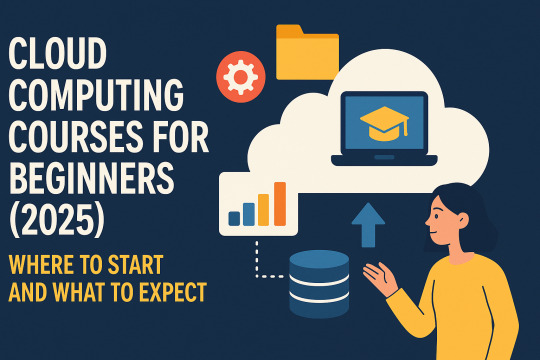
👨🎓 New to Tech? Wondering if You Can Learn Cloud Computing?
You’ve seen the job listings. You’ve heard about AWS, Azure, and Google Cloud. You might’ve even asked yourself, “Is this something I can learn, or is it only for experienced developers?”
Here’s the honest answer: Yes, you absolutely can learn cloud computing—even as a beginner. And no—you don’t need to be a coder to get started.
🧠 What Exactly Is Cloud Computing?
Let’s break it down in real-world terms.
Cloud computing is about accessing technology services (like servers, storage, and databases) over the internet instead of owning them physically. Just like you stream music without downloading every song, companies use cloud platforms to run apps without buying physical machines.
This makes cloud computing:
🔄 Scalable
⚡ Fast
💰 Cost-effective
🌐 Accessible from anywhere
Think of it as “IT on rent.”
🌐 What Are the Major Cloud Platforms?
There are three major players in the cloud computing space:
🔹 Amazon Web Services (AWS)
Largest market share globally
Great documentation and job demand
Ideal for beginners starting a cloud career
🔹 Microsoft Azure
Preferred by companies already using Microsoft services
Common in large enterprises and MNCs
Works well for IT support engineers or Windows admins
🔹 Google Cloud Platform (GCP)
Known for machine learning, analytics, and modern web apps
Growing ecosystem with startups and AI companies
Ideal for learners with interest in data + development
🎓 What to Expect from a Beginner-Friendly Cloud Course?
The right course should cover:
Cloud concepts: IaaS, PaaS, SaaS
Platform navigation (AWS Console, Azure Portal, GCP Dashboard)
Virtual Machines, storage, identity & access
Networking and basic security setup
Hands-on labs and small projects
Guidance for entry-level certifications
And most importantly, it should be beginner-friendly—not overloaded with theory or code.
🧑🏫 Why Learn Cloud with NareshIT?
At NareshIT, we’ve trained over 100,000 students in real-world IT skills. Our cloud computing courses are designed to help absolute beginners start from scratch, learn hands-on, and become confident enough to apply for jobs or certifications within weeks.
📘 NareshIT’s Cloud Computing Courses for Beginners
✅ AWS Cloud Foundations (Beginner Level)
Duration: 60 Days
Topics: EC2, IAM, S3, Lambda, VPC
Bonus: Live labs, project guidance, AWS Cloud Practitioner & Associate certification prep
Outcome: Ready for junior cloud jobs & support roles
✅ Azure Essentials Course (Beginner + Admin)
Duration: 45 Days
Topics: Azure AD, VMs, Blob Storage, Azure Monitor
Bonus: AZ-900 + AZ-104 prep, DevOps preview
Outcome: Ideal for support engineers and system admins
✅ GCP Starter Course (Beginner + Cloud Native Tools)
Duration: 30 Days
Topics: Compute Engine, IAM, BigQuery, Cloud Functions
Bonus: GCP Associate Cloud Engineer certification coaching
Outcome: Great for data lovers and devs entering cloud
🎓 DevOps with Multi-Cloud Training in KPHB by NareshIT
Located in Hyderabad’s tech-learning hub, NareshIT’s DevOps with Multi-Cloud Training in KPHB is tailored for:
✅ Beginners who want an IT job fast
✅ Professionals switching from support/manual testing
✅ Freshers looking for job-ready cloud + DevOps skills
🧾 Course Highlights:
Cloud Platforms Covered: AWS, Azure, GCP
DevOps Tools: Git, Jenkins, Docker, Kubernetes, Terraform
Duration: ~60 days
Batch Options: Weekday, Weekend, Fast-track
Includes: Real-world projects, certification support, job readiness prep
Location: KPHB, Hyderabad (Online + Offline options)
📅 New Batches Are Starting Now Choose from weekday, weekend, or fast-track options based on your schedule.
👉 Check NareshIT's Latest Cloud Batches Here
🧩 Bonus: Why Learning Cloud Computing Is Worth It
💼 High-demand job roles: Cloud support, DevOps, Admin
💸 Strong entry-level salaries: ₹4.5 to ₹7 LPA (for certified freshers)
🌱 Fast career growth: Start simple, grow into architecture or security
🌍 Global opportunities: Remote jobs across India, US, UAE, and more
You don’t need to master everything at once. Just start with one platform. And with the right mentor, you'll move faster than you thought possible.
#DevOpsWithMultiCloud#CloudCoursesHyderabad#LearnAWSAzureGCP#CareerInCloud#DevOpsForBeginners#CloudSkillsIndia#MultiCloudTrainingIndia#TechJobsHyderabad#CloudCertifications2025
0 notes
Text
Top Training Institutions in Ameerpet for DevOps and AWS DevOps Courses
Introduction
Ameerpet, located in Hyderabad, India, has earned a reputation as a hub for quality IT training. Whether you're a fresh graduate or a working professional looking to upskill, Ameerpet offers a wide array of training institutions that cater to the growing demand for DevOps and AWS DevOps skills.
Why Ameerpet is a Preferred Location for IT Training
Ameerpet has long been recognized as a hotspot for IT courses due to its affordable fees, experienced faculty, and real-time project-based training. With the rise of cloud computing and automation, DevOps training institutes in Ameerpet have tailored their programs to align with current industry demands.
DevOps Course Online in Ameerpet
For those who can't attend classes in person, many institutes offer DevOps courses online in Ameerpet. These online courses provide flexibility without compromising on the quality of instruction. Live sessions, recorded videos, doubt-clearing sessions, and hands-on labs are commonly included.
DevOps Training Online in Ameerpet: What to Expect
Online training programs in Ameerpet usually cover:
Introduction to DevOps culture and practices
CI/CD pipelines using Jenkins
Containerization with Docker and Kubernetes
Version control with Git and GitHub
Infrastructure as Code using Ansible and Terraform
Students enrolled in DevOps training online in Ameerpet gain both theoretical knowledge and practical exposure, often guided by industry experts.
DevOps Classroom Training in Ameerpet
For learners who prefer traditional setups, DevOps classroom training in Ameerpet offers an immersive environment with face-to-face interaction. These sessions are highly interactive and ideal for people who thrive on immediate feedback and collaboration.
AWS DevOps Course in Ameerpet
With the growing importance of cloud-native DevOps, several institutions now offer a specialized AWS DevOps course in Ameerpet. These courses focus on:
AWS services such as EC2, S3, Lambda, and CloudFormation
CI/CD automation using AWS CodePipeline and CodeBuild
Monitoring and logging with CloudWatch and X-Ray
These courses are designed to help students prepare for AWS Certified DevOps Engineer exams and build strong practical skills.
How to Choose the Best DevOps Training Institute in Ameerpet
When selecting a DevOps training institute in Ameerpet, consider the following:
Curriculum alignment with industry trends
Trainer qualifications and industry experience
Access to hands-on labs and real-world projects
Flexibility for online or offline learning
Placement assistance and certification support
Conclusion
Whether you're looking for a DevOps course online in Ameerpet or prefer the traditional classroom route, there are plenty of reputable training institutions in Ameerpet that can help you build a successful DevOps career. From basic principles to advanced AWS DevOps practices, Ameerpet remains a top destination for IT training.
#devops training institute in ameerpet#devops classroom training in ameerpet#aws devops course in ameerpet
0 notes
Text

Docker and Kubernetes Online Training
Visualpath provides the best Kubernetes Online Training classes by real-time faculty with real-time Projects. We are providing Kubernetes Certification Training Course Demanded in the USA, UK, Canada, India, and Australia. Call on +91-9989971070.
WhatsApp: https://bit.ly/47eayBz
Visit: https://www.visualpath.in/DevOps-docker-kubernetes-training.html
#docker and kubernetes training#docker online training#docker training in hyderabad#kubernetes training hyderabad#docker and kubernetes online training#docker online training hyderabad#kubernetes online training#kubernetes online training hyderabad
0 notes
Text
Unlock Your Future with DevOps AWS Courses in Hyderabad – IntelliQ IT
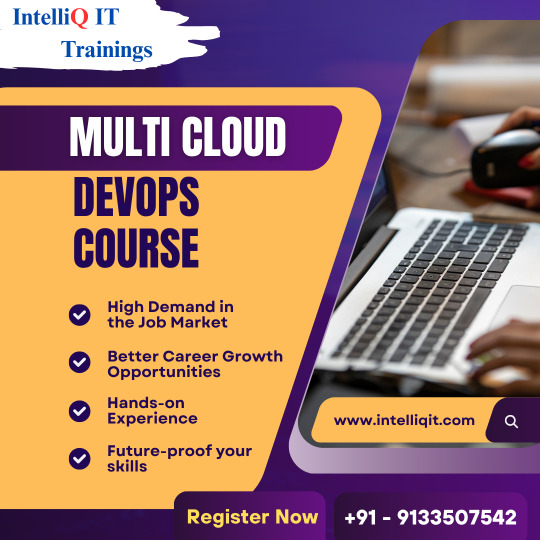
In today’s rapidly transforming IT industry, DevOps has emerged as a must-have skillset for professionals aiming to bridge the gap between development and operations. Hyderabad, being a top IT hub in India, is witnessing a growing demand for skilled DevOps professionals. If you're exploring top DevOps institutes in Hyderabad or looking to upskill with DevOps AWS courses in Hyderabad, you're on the right path to shaping a lucrative and future-proof career.
Why Choose DevOps?
DevOps is a culture and set of practices that bring development and operations teams together to shorten the development life cycle and deliver high-quality software continuously. By adopting DevOps, organizations improve productivity, enhance deployment frequency, and reduce the rate of failure for new releases.
Professionals skilled in DevOps tools like Docker, Kubernetes, Jenkins, Ansible, Terraform, and cloud platforms like AWS are in high demand across startups, MNCs, and tech giants.
The Rising Demand for DevOps and AWS Skills
With companies migrating their infrastructure to the cloud, AWS (Amazon Web Services) has become the leading cloud services provider. Integrating AWS with DevOps tools allows organizations to automate deployments, monitor systems, and scale applications effortlessly.
Learning DevOps with AWS is no longer a luxury—it’s a necessity. Hyderabad’s tech ecosystem demands certified professionals who can seamlessly integrate DevOps methodologies on AWS platforms.
DevOps Institutes in Hyderabad: What to Look For
When searching for DevOps institutes in Hyderabad, it’s essential to consider:
Comprehensive Curriculum: Ensure the course covers both foundational and advanced DevOps tools, cloud integration (especially AWS), CI/CD pipelines, and containerization technologies.
Hands-on Training: Practical exposure through real-time projects, labs, and case studies is critical for mastering DevOps.
Expert Trainers: Learn from certified trainers with industry experience in DevOps and AWS.
Placement Assistance: Institutes that offer resume building, mock interviews, and placement support can significantly boost your job prospects.
IntelliQ IT: A Trusted Name in DevOps AWS Training
Among the top DevOps institutes in Hyderabad, IntelliQ IT stands out for its dedication to delivering industry-relevant training. IntelliQ IT offers a well-structured DevOps AWS course in Hyderabad, designed for freshers, working professionals, and IT enthusiasts. The course not only covers key DevOps tools but also includes extensive AWS integration, ensuring you're job-ready from day one.
With a focus on real-time projects, practical labs, and expert mentorship, IntelliQ IT helps you build the confidence and skills required to crack interviews and succeed in the DevOps domain.
Key Features of IntelliQ IT's DevOps AWS Course:
In-depth coverage of AWS services like EC2, S3, IAM, CloudFormation, and more.
Practical training on CI/CD tools like Jenkins, Git, and Docker.
Live projects simulating real-world scenarios.
100% support in resume building and job placement.
Flexible batch timings including weekend and online classes.
Conclusion
If you are serious about your IT career, enrolling in DevOps AWS courses in Hyderabad is a smart investment. The synergy of DevOps and AWS is creating unmatched opportunities for tech professionals, and choosing the right institute is the first step toward success.
For quality-driven training with real-time exposure, IntelliQ IT is a name you can trust among the top DevOps institutes in Hyderabad. Take the leap today and power your career with cutting-edge skills in DevOps and AWS.
#devops training in ameerpet#devops training hyderabad#devops in ameerpet#devops course in hyderabad#aws institute in ameerpet
1 note
·
View note
Text
Master in Java Full Stack Development: Comprehensive Training at Monopoly IT Solutions
Java full-stack development is one of the most in-demand skills in the software industry today. With businesses increasingly relying on web-based applications, professionals skilled in both front-end and back-end technologies are highly sought after. If you’re looking to build a successful career in this field, enrolling in the Best Java Training Institute in Hyderabad, Kukatpally, KPHB can provide you with the right guidance and hands-on experience to master Java Full Stack Development.
What is Java Full Stack Development?
Java full-stack development involves working with both the client-side and server-side of applications. A Java Full Stack Developer must be proficient in:
Front-End Technologies: HTML, CSS, JavaScript, and frameworks like Angular or React.
Back-End Development: Core Java, Spring Boot, Hibernate, and RESTful APIs.
Database Management: MySQL, PostgreSQL, and MongoDB for efficient data handling.
DevOps & Cloud Technologies: Deploying applications using Docker, Kubernetes, and cloud services.
Why Learn Java Full Stack Development?
High Demand: Companies prefer developers who can handle both front-end and back-end tasks.
Robust Ecosystem: Java offers a secure and scalable environment for enterprise applications.
Versatile Career Opportunities: Roles include full-stack developer, software engineer, and web developer.
Conclusion
By mastering Java Full Stack Development, you can unlock numerous job opportunities in the ever-growing tech industry. Enrolling in a professional training program ensures structured learning and practical exposure. For top-quality training and expert mentorship, choose Monopoly IT Solutions, the leading institute for Java Full Stack Development.
0 notes
Text
DevOps with Multi-Cloud:
A Beginner’s Guide Introduction In today’s fast-paced digital world, businesses need agility, reliability, and scalability. This is where DevOps with Multi-Cloud comes in.
By integrating DevOps practices across multiple cloud platforms, companies can optimize workloads, enhance security, and reduce vendor dependency.
If you’re looking for DevOps with Multi-Cloud Training in KPHB, this guide will help you understand the essentials.

What is DevOps with Multi-Cloud?
DevOps is a methodology that combines development (Dev) and operations (Ops) to streamline software delivery.
When paired with a multi-cloud approach—using multiple cloud providers like AWS, Azure, and Google Cloud—it brings flexibility and resilience to IT infrastructure.
Benefits of DevOps in a Multi-Cloud Environment Avoids Vendor Lock-in – Businesses can distribute workloads across different cloud providers.
Improved Disaster Recovery – If one cloud fails, another can handle operations. Cost Optimization – Companies can choose the most cost-effective cloud services.
Enhanced Performance – Running applications closer to users reduces latency.
Security & Compliance – Spreading workloads minimizes risks and ensures compliance with industry regulations. Key Components of DevOps with Multi-Cloud
CI/CD Pipelines – Automate code building, testing, and deployment. Infrastructure as Code (IaC) – Manage cloud resources using tools like Terraform or AWS CloudFormation.
Containerization & Orchestration – Docker and Kubernetes help maintain consistency across cloud environments. Monitoring & Logging – Tools like Prometheus and ELK Stack ensure system health.
Security & Compliance Automation – Integrate security into development workflows with DevSecOps. Challenges in Multi-Cloud DevOps
Complexity in Management – Handling multiple cloud platforms requires expertise.
Data Governance & Compliance – Managing regulations across different clouds is challenging.
Interoperability Issues – Ensuring seamless communication between cloud environments can be difficult. How to Overcome These Challenges?
Use multi-cloud management tools like HashiCorp Consul or Google Anthos. Implement automation to reduce manual configuration.
Follow best security practices to protect data across cloud platforms. DevOps with Multi-Cloud Training in KPHB If you’re in KPHB, Hyderabad, and want to master DevOps with Multi-Cloud, look for training programs that cover:
✔️ Hands-on experience with AWS, Azure, and Google Cloud
✔️ Real-world CI/CD pipeline implementation
✔️ Kubernetes & Docker container orchestration
✔️ Infrastructure as Code (IaC) with Terraform
✔️ Security best practices in a multi-cloud setup
FAQs
1. Why should I learn DevOps with Multi-Cloud?
DevOps with Multi-Cloud enhances career opportunities and helps businesses stay competitive in an evolving digital landscape.
2. Which cloud platforms are covered in multi-cloud training?
Popular platforms include AWS, Microsoft Azure, and Google Cloud Platform (GCP). Some courses also cover Oracle Cloud, IBM Cloud, and Alibaba Cloud.
3. What are the prerequisites for learning DevOps with Multi-Cloud?
Basic knowledge of cloud computing, Linux, and scripting languages like Python or Bash is helpful. However, beginner-friendly courses are available.
4. How long does it take to become proficient?
Depending on prior experience, 3-6 months of dedicated learning can help you gain proficiency in DevOps with Multi-Cloud.
5. Is certification necessary?
While not mandatory, certifications from AWS, Azure, or Google Cloud can boost your job prospects.
Conclusion
DevOps with Multi-Cloud is the future of IT infrastructure, offering flexibility, efficiency, and resilience.
If you're looking for DevOps with Multi-Cloud Training in KPHB,
start your journey today to gain the skills needed for a high-demand career.
#DevOps#MultiCloud#CloudComputing#AWS#Azure#GoogleCloud#Kubernetes#Docker#CICD#InfrastructureAsCode#Terraform#DevSecOps#HybridCloud#TechTraining#ITCareers#KPHB#Hyderabad#CloudSecurity#Automation#DevOpsEngineer#TechSkills#CloudNative#SoftwareDevelopment#ITTraining#CareerGrowth#CloudTechnology
0 notes
Text
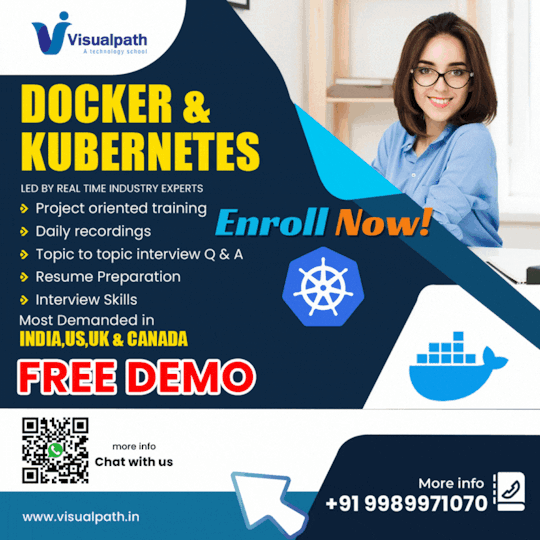
Docker and Kubernetes Online Training
Visualpath provides the best Kubernetes Online Training classes by real-time faculty with real-time Projects. We are providing Docker and Kubernetes Training Demanded in the USA, UK, Canada, India, and Australia. Call on +91-9989971070.
WhatsApp: https://bit.ly/47eayBz
Visit: https://www.visualpath.in/DevOps-docker-kubernetes-training.html
Blog: https://dockerandkubernetesonlinetraining.blogspot.com/
#docker and kubernetes training#docker online training#docker training in hyderabad#kubernetes training hyderabad#docker and kubernetes online training#docker online training hyderabad#kubernetes online training#kubernetes online training hyderabad
0 notes
Text

IntelliQ IT Trainings is a leading institute in Hyderabad, known for delivering the best AWS DevOps training in Ameerpet with real-time project experience and expert mentorship. Designed for both beginners and professionals, the program covers essential tools like AWS, Jenkins, Docker, Kubernetes, Terraform, and more. With flexible class timings, personalized guidance, and strong placement support, IntelliQ ensures you're industry-ready from day one.
1 note
·
View note
Text
AWS and Devops Training in Hyderabad
The Combination of Both Aws and Devops is Highly a Good Combination in the market it has been a highly demanded Designation in software industry so, most of companies are rapidly hiring Aws and Devops cloud engineers.
Why Learn AWS And Devops Together? Aws is the leading cloud platform, while Devops ensure efficent automation and CI/CD pipelines. High demand for Aws and devops in the Hyderabad and worldwide. ofeers higher salaries and career growth opportunities.

What you will learn in Awd and Devops in Training Period? Aws cloud Fundamentals-EC2,S3,IAM,VPC,RDS and more Services. Devops Tools- Git,Docker,Kubernetes,Jenkins,Terraform,Ansible. CI/CD pipelines & IAC. Hands-on Aws Devops Projects with real time experience. Caree opportunities with AWS and Devops roles Such as:
AWS Devops Engineer Cloud Engineer Devops Architect Automation Engineer Site Reliability Engineer
For these Hyderabad is a top Version IT destination offering Quality with: Experienced trainers with real-world AWS Devops expertise. Hands-on learning with live projects. Placement assistance and career guidance.
Start your career with an Advanced AWS and Devops Training in Hyderabad.at VersionIT institution to gain expertise to work in cloud automation and Devops-driven environment
#softwaredevelopment#devops#software#it services#viral trends#trending#market trends#viral#aws#awscloud#cloud computing
1 note
·
View note
Text
Top 5 In-Demand DevOps Roles and Their Salaries in 2025
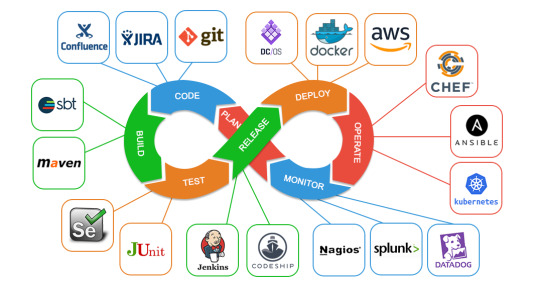
The DevOps field continues to see massive growth in 2025 as organizations across industries prioritize automation, collaboration, and scalability. Here’s a look at the top 5 in-demand DevOps roles, their responsibilities, and salary trends.
1. DevOps Engineer
Role Overview: The cornerstone of any DevOps team, DevOps Engineers manage CI/CD pipelines, ensure system automation, and streamline collaboration between development and operations teams.
Skills Required: Proficiency in Jenkins, Git, Docker, Kubernetes, and scripting languages like Python or Bash.
Salary Trends (2025):
Freshers: ₹6–8 LPA
Experienced: ₹15–20 LPA
2. Site Reliability Engineer (SRE)
Role Overview: SREs focus on maintaining system reliability and improving application performance by blending engineering and operations expertise.
Skills Required: Knowledge of monitoring tools (Prometheus, Grafana), incident management, and system architecture.
Salary Trends (2025):
Entry-Level: ₹7–10 LPA
Experienced: ₹18–25 LPA
3. Cloud Engineer
Role Overview: Cloud Engineers design, manage, and optimize cloud infrastructure, ensuring it is secure, scalable, and cost-effective.
Skills Required: Hands-on experience with AWS, Azure, or Google Cloud, along with infrastructure as code (IaC) tools like Terraform or Ansible.
Salary Trends (2025):
Beginners: ₹8–12 LPA
Senior Professionals: ₹20–30 LPA
4. Kubernetes Specialist
Role Overview: As businesses increasingly adopt containerization, Kubernetes Specialists manage container orchestration to ensure smooth deployments and scalability.
Skills Required: Deep understanding of Kubernetes, Helm, Docker, and microservices architecture.
Salary Trends (2025):
Mid-Level: ₹8–15 LPA
Senior-Level: ₹18–25 LPA
5. DevSecOps Engineer
Role Overview: DevSecOps Engineers integrate security practices within the DevOps lifecycle, ensuring robust systems from development to deployment.
Skills Required: Expertise in security tools, vulnerability assessment, and compliance frameworks.
Salary Trends (2025):
Early Career: ₹9–14 LPA
Experienced Professionals: ₹22–30 LPA
Upskill for Your Dream Role
The demand for DevOps professionals in 2025 is higher than ever. With the right skills and certifications, you can land these lucrative roles.
At Syntax Minds, we offer comprehensive DevOps training programs to equip you with the tools and expertise needed to excel. Our job-oriented courses are available both offline and online, tailored for fresh graduates and working professionals.
Visit Us: Flat No. 202, 2nd Floor, Vanijya Complex, Beside VRK Silks, KPHB, Hyderabad - 500085
Contact: 📞 9642000668, 9642000669 📧 [email protected]
Start your journey today with Syntax Minds and take your career to new heights!
#artificial intelligence#data science#deep learning#data analytics#machine learning#DevOps#Cloud#AWS#AZURE#data scientist
0 notes
Text
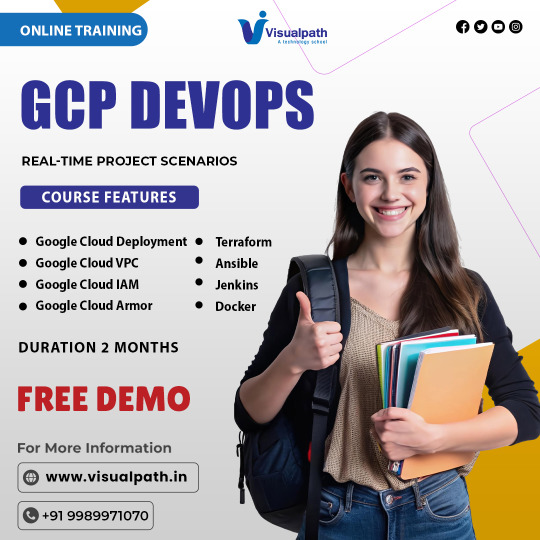
#Visualpath provides industry-leading #gcpdevops Training to professionals across the globe, including the USA, UK, Canada, Dubai, Australia, and Hyderabad. Our GCP DevOps Certification Training covers key skills like CI/CD, Kubernetes, Terraform, Docker, Jenkins, and Google Cloud services. Kickstart your career in cloud computing with expert guidance. Call +91-9989971070 for a free demo today!
WhatsApp: https://www.whatsapp.com/catalog/919989971070
Visit: https://www.visualpath.in/online-gcp-devops-certification-training.html
Visit our Blog: https://visualpathblogs.com/
#GCPTraining#DevOpsTraining#CloudComputing#KubernetesTraining#TerraformTraining#OnlineLearning#TechTraining#CareerInCloud#GCPDevOps#GoogleCloudTraining#Visualpath#HyderabadTraining#GlobalTechTraining#LearnDevOps#CI_CD#TechCareerBoost#CloudCareer#DevOpsCertification#HandsOnTraining#OnlineTechCourses
0 notes